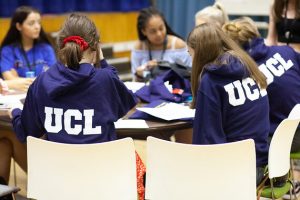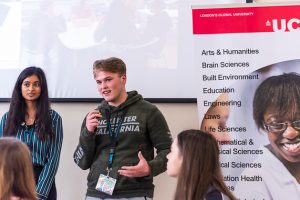We recently caught up with Becky King, a teacher (at The Duston School, Northamptonshire) who is currently participating in our UCL Teacher Action Research Project (TARP). Becky explains how she came to be involved in the project, her challenges and early success and the importance of cherry bakewell cakes!
1.How did you come to be involved in the UCL Teacher Action Research Project (TARP)?
My first experience of UCL came from attending the UCL Teacher Summer School in 2017. I enjoyed myself so much that I applied the subsequent year. The focus of the 2018 event was on action research; something that I had begun to explore through being part of the DART (Duston School Action Research Team) and felt had the potential to improve the quality of my teaching. It still all felt quite a ‘woolly’ topic and I initially struggled to see how I could balance my day-to-day tasks with completing my own project but the sessions with experts in educational research soon made me realise that being research-informed would add value to every aspect of my practice. I now find myself questioning the impact of what I do in the classroom far more than in previous years. When the UCL Teacher Action Research Project (TARP) was launched, I jumped at the chance to work with the UCL Institute of Education and benefit from the expertise of Mark Quinn and left UCL in June feeling genuinely enthused about the journey I was planning for my top set Year 11 students in 2018-19.
2. What areas(s) does your research project explore?
 My research question is ‘To what extent does teacher modelling, implemented for six weeks, improve the attainment for high achieving pupil premium students in English at GCSE?’ The question has evolved somewhat since June and it was valuable to spend over an hour writing and amending our questions as a group in October. I think we had all underestimated the importance of phrasing our research question in the most appropriate way. I came away with over fifteen versions of my initial question to reflect on and hone over time.
My research question is ‘To what extent does teacher modelling, implemented for six weeks, improve the attainment for high achieving pupil premium students in English at GCSE?’ The question has evolved somewhat since June and it was valuable to spend over an hour writing and amending our questions as a group in October. I think we had all underestimated the importance of phrasing our research question in the most appropriate way. I came away with over fifteen versions of my initial question to reflect on and hone over time.
3. In what way does your research and development project focus on disadvantaged students?
Whilst the work I am doing aims to benefit every student in my Year 11 class, I am paying particular attention to the progress of the small number of pupil premium students. As a school, particular emphasis is being placed on improving the performance of high prior attaining students in English.
4.How does the project link to your role at school?
As KS4 Coordinator for English, looking at research into improving the grades of the most able students in the school fits in perfectly with my job title. It has been useful to reflect on conversations I’ve had with colleagues at UCL back at school with members of the English department. I have also been able to pass on resources like the pre-reading and frameworks that Mark shared with us in October to the Action Research Team at school.
5.Tell us a bit more about the implementation of your research so far; what challenges or early success have you encountered?
As every teacher knows, there are definitely times when it would be easier to dig out a PowerPoint from their hard drive than be innovative and take chances and I initially struggled to provide students with worked examples every week. I was constantly feeling as though my lessons were becoming dull and that I should be ‘entertaining’ the students (as my teacher training had encouraged me to do). Once the Head provided me with a visualiser, I found that talking students through planning and writing responses slowly and methodically was far more valuable than anything I had done previously with KS4 groups. From seeing more exemplars, students have a better grasp of how to write a conceptualised answer for Literature and how to reach the top bands on the mark scheme in Language.
6. How do you plan to share your learning from the project with colleagues from school/ the wider sector?
 On the 30th of March, I will be presenting at the Educating Northants conference alongside three of my DART colleagues. Although it’s nerve-wracking, I’m excited to share the work that I’ve been doing and show other teachers that being research-informed will improve their practice and make their work lives simpler. I am also speaking at the forthcoming ResearchEd Northants event at The Duston School on the 5th of October, where I will be able to evaluate the success of my project against the 2019 GCSE results.
On the 30th of March, I will be presenting at the Educating Northants conference alongside three of my DART colleagues. Although it’s nerve-wracking, I’m excited to share the work that I’ve been doing and show other teachers that being research-informed will improve their practice and make their work lives simpler. I am also speaking at the forthcoming ResearchEd Northants event at The Duston School on the 5th of October, where I will be able to evaluate the success of my project against the 2019 GCSE results.
7. What one piece of advice would you give to a colleague thinking about undertaking a school-based research and development project?
Don’t be intimidated! I used to think that I wasn’t intelligent enough, well-read enough or a decent enough teacher to take part in a scheme such as the UCL Teacher Action Research Project (TARP) but everyone has been so positive and supportive that I really feel like my teaching (and confidence) is going from strength to strength.
8. Which fictional teacher (from film, TV or literature) do you most identify with, and why?!
My favourite literary character is Elizabeth Bennet. She’s opinionated, is a good sister, has a strong moral compass and won’t be taken for a fool, although I suspect I come across as more of a Jane Eyre that a Bennet!
For more information please visit our UCL Teacher Research projects webpage.
Applications for the UCL Teacher Summer School 2019 are open now, for full details please visit our website.
 Applications are now open for our free Year 12 Sutton Trust Summer Schools.
Applications are now open for our free Year 12 Sutton Trust Summer Schools.
 Close
Close




